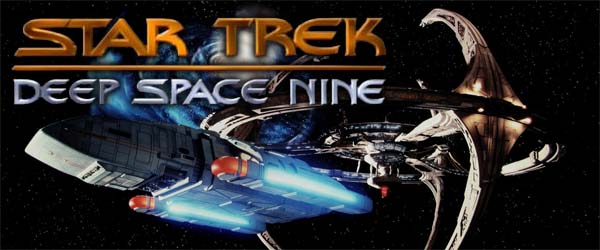
In the age of streaming and binge-watching here in the year 2023, long-form serialized television is now ubiquitous. Every network and streaming service has wanted its own blockbuster TV shows. Whether it's AMC's The Walking Dead and Breaking Bad, HBO's Game of Thrones, Sci-Fi's Battlestar Galactica, Netflix's House of Cards and Stranger Things, History's Vikings, and so forth, it seems that every big new show outside of sit-coms has a heavily-serialized format. Procedural dramas are going the way of the dinosaur.
Serialized, long-form television may be commonplace now, but back in the 1990's, it was virtually unheard of outside of daytime soap operas (such as Dallas and Dynasty) and the occasional network mini-series. At least, this was the case in the United States. British television has a much longer track record of serialized story-telling. A big part of why serialized television was uncommon was that the producer(s) of network syndicacted shows didn't have as much control over when its affiliates decided to air the shows, or how heavily they would market and advertise it. Furthermore, the networks or affiliates could change the time slot of the show pretty much at a whim. Viewership, therefore, would be much more fickle and fractured. Audiences would pop in and drop out. Expecting the audience to have seen every previous episode in preparation for this week's episode was a dangerous and risky expectation for a production studio. It's easy to lose viewers if none of them know what's going on.
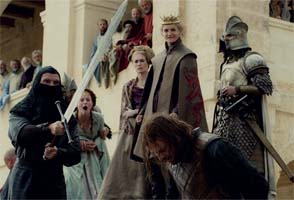 - Game Of Thrones, copyright HBO
- Game Of Thrones, copyright HBO
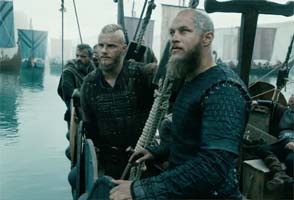 - Vikings, copyright History Channel
- Vikings, copyright History Channel
Highly serialized, long-form drama are the norm for modern networks and subscription television services.
As I mentioned in the previous essay, this was the case with me. I was in elementary school and middle school during DS9's run, and I missed a lot of episodes in the first couple seasons, despite wanting to watch the show. Missing so many episodes meant that I had very little idea what was going on when I would watch, and so I mostly lost interest in the show. If my dad was watching it, and I was there, I'd watch it, but I wasn't planning my day around it.
Looking back now, that sort of serialized story-telling is now ubiquitous and expected, and so it's easier to recognize that Deep Space Nine was truly innovative and ahead of its time in this regard.
Long-form story-telling
Serialized story-telling wasn't alien to Star Trek. Deep Space Nine premiered in 1993, the same year as the sixth season of Next Generation. By this time, The Next Generation had several story threads that had recurred over the course of a season, or over multiple seasons -- as well as several attempted overarching plot threads that were dropped.
As early as the first season of Next Generation, Q had become a recurring antagonist, and his "judgement" over the human race was established as a recurring plot thread. Heck Q's judgement of humanity was originally depicted as the framing mechanism for the entire show! It was scaled back in the following seasons due to the general poor reception of the first season, and the fact that John de Lancie just works better in a more whimsical and comic role.
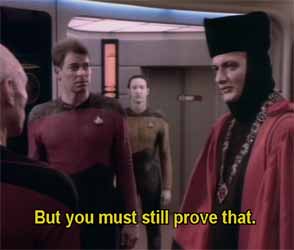 - TNG "Encounter At Farpoint", season 1, episode 1
- TNG "Encounter At Farpoint", season 1, episode 1
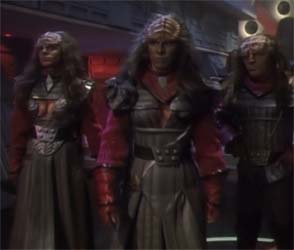 - TNG "Redemption, Part I", season 4, episode 26
- TNG "Redemption, Part I", season 4, episode 26
TNG had several recurring plot threads.
The final two episodes of Next Generation's first season, "Conspiracy" and "The Neutral Zone", seem to have been part of an abandoned attempt at more long-form story-telling. Both seem to be trying to establish some new threat to the Federation (and possibly a shared threat between the Federation and other rival powers such as the Romulans). I think the original idea was for this to become an overarching storyline for the entire series. But the thread from "Conspiracy" was completely dropped, and the destroyed colonies referenced in "The Neutral Zone" were re-written to be retroactive foreshadowing of the Borg's appearance in season 2.
[More]
cddb26c9-ca5a-4327-b199-d0d00dec522b|0|.0
Tags:Star Trek, Star Trek: Deep Space Nine, Federation, Starfleet, progressivism, humanism, secularism, religion, fundamentalism, fascism, terrorism, war, trans-gender, Worf, Odo, Quark, Moogie, Ishka, Bajor, Dominion, Founder, Changeling, Jem'Hadar, Cardassian, streaming television, Game of Thrones, Battlestar Galactica, the X-Files, Babylon 5, Buffy the Vampire Slayer, The Sopranos, Lost, Twin Peaks

The Next Generation, Deep Space Nine, and (depending on who you talk to) Voyager are widely regarded as the "Golden Age" of Star Trek. Since many Trekkies look back at this time period of the late 80's and 90's with the rose-tinted glasses of nostalgia, it might surprise you to read that Deep Space Nine used to be a highly divisive topic among Star Trek fans. Even to this day, I've talked to "hardcore" Trek purists who dislike Deep Space Nine because of how dark and conflict-driven the series is. I can't imagine what these people must think of the Kelvin-verse reboots, Star Trek: Discovery, or Picard. If you think I'm hard on those recent iterations of Star Trek, then you should talk to these people!
In any case, the idea that DS9 is too dark and conflict-driven is a valid criticism from someone coming from the perspective of a fan of The Original Series and Next Generation. Both of those shows were about an idealistic future in which humanity had grown out of its petty squabbles and now seeks to better itself through cooperative exploration and colonization of space. Deep Space Nine didn't quite accept those ideas at face-value. Deep Space Nine's more pragmatic approach had some fans believing that Deep Space Nine violated the spirit of Star Trek.
Many fans of The Original Series and Next Generation criticized Deep Space 9 for being "too dark".
Deep Space Nine was also the first Trek series to be highly serialized, having a singular, overarching plot throughout most of the series, and with frequent mini-arcs running for half a season or a whole season. TNG had its share of recurrent story arcs. Q's "trial of humanity" was pitched as a framing mechanism for the entire show, but ended up only serving to bookend the series, while relegating most of Q's appearances each season as comic tangents. There were other recurrent sub-plots as well, such as Worf's discommendation from the Klingon Empire and his conflict with the Duras House in the "Sins of the Father" arc, the Borg story thread, Data's relationship with his brother Lore, Wesley's training as a Starfleet officer, and a few others. But TNG stayed mostly episodic. Almost all the single episodes of TNG (and the two-parters as a whole) can be enjoyed independently, without having seen any previous episodes of TNG. That was not the case with DS9.
I missed many episodes of DS9 because
it aired on weekend evenings.
DS9 was on the air throughout my elementary school and middle school years (I was seven when the show premiered). It frequently aired (syndicated on Fox in my region) on weekend evenings, and I was often outside playing tag, riding bikes, or playing touch football or street basketball with neighbor kids. As such, I missed a lot of episodes. Due to the highly-serialized nature of the show, when I would see an episode, I would have no idea what was going on! Because I rarely watched the show, and didn't understand it when I did see it, I didn't particularly like it. I'd still watch it, because it was still Star Trek. In fact, Voyager was the first Star Trek series that I watched regularly (it being on Wednesday nights, when I wasn't outside playing), and, well, you all know how I feel about Voyager.
In fact, I grew up with a bit of a preconceived notion that Deep Space Nine was the "bad" Star Trek series -- even though critics at the time largely appreciated it. On the off chance that I could talk about Star Trek with a peer, they generally didn't like DS9 either -- for many of the same reasons.
It wasn't until my college years, when the show was released for sale on DVD that I sat down and watched the whole series from start to finish. At first, I wasn't even sure if I wanted to bother buying the DVDs. After all, DS9 was "the bad Star Trek". So why spend the money? And those DVDs cost a lot of money! CBS wanted something like $120 for a single season, compared to $30 or $40 a season for shows like E.R. or Grey's Anatomy. At least the Next Gen DVDs came in fancy, sturdy boxes. The DS9 DVDs came in cheap, flimsy, rigid plastic booklets that start to fall apart as soon as you open them. I think my mom bought them from Costco for $90 a pop -- a considerable discount, but still obnoxiously expensive!
CBS wanted $120 per season for DS9 DVDs!
I was now older. I was coming to terms with my personal identity as a progressive secular humanist. Most importantly, I could finally follow along with the various multi-episode story threads and the complex, nuanced characterizations. And boy, did my opinions on the series change!
I'll always have a soft spot for Next Generation. That show has my favorite Trek character: Data. And Picard is probably my third favorite character after Spock. After my single favorite episode of Trek, the Original Series' "Balance of Terror", most of my runner-up favorite episodes are TNG episodes. Episodes like "The Measure of a Man", "Who Watches the Watchers", "The Offspring", "The Best of Both Worlds", "Deja Q", "I, Borg", "Tapestry", "The Inner Light", "Darmok", "All Good Things...", and so on...
Despite my fondness for Next Generation, I actually think that Deep Space Nine is the better all-around show.
Every Trek series since the original has taken a couple years to really find its footing. TNG doesn't really figure itself out until midway through season 2, and Voyager takes until the 4th season to figure itself out -- if ever. I don't know if Discovery ever righted its ship, since I didn't bother to watch past the first season, and Picard didn't even become watchable until the third season. I feel like DS9 finds its footing much earlier than TNG or Voyager. Deep Space Nine's characters, themes, and stories start to fall in place by the end of season 1. In fact, one of my favorite episodes of the entire series (and one of my favorite episodes of Trek in general) is a season 1 episode: "Duet". DS9 is the only Trek series (since the original) for which one of my favorite episodes comes as early as the first season.
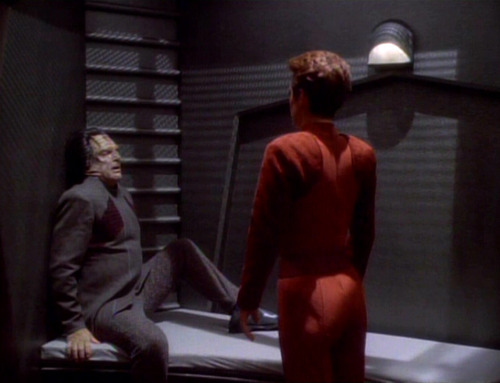 - DS9 "Duet", season 1, episode 19
- DS9 "Duet", season 1, episode 19
One of my favorite DS9 episodes (and Trek episodes in general) is the season 1 Holocaust allegory, "Duet".
The last episode of season 1, "In the Hands of the Prophets" starts to set up the season-long arcs (and a series-long arc) that would become a trademark of the series. That episode introduces us to recurring villain Vedek Winn and starts the process of her gradual accumulation of power, which we'll talk about later.
But despite the series coming together better in the first season, critics of Deep Space Nine aren't wrong when they say that it "feels different" from the Original Series or Next Generation. The show is unarguably darker and more conflict-driven. The entire second half of the series is about an interstellar war, and the seasons leading up to that repeatedly tell stories about domestic terrorism, Holocaust allegories, religious persecution, and cynical politics. These sorts of themes were present in episodes of TOS and TNG here and there, but DS9, at a fundamental level, was about these difficult topics.
[More]
79b833d8-97bd-4e2f-b45e-9f666db1588a|1|5.0
Tags:Star Trek, Star Trek: Deep Space Nine, Gene Roddenberry, Federation, Starfleet, culture, ideals, cooperation, socialism, post-scarcity economics, alien, multi-culturalism, progressivism, humanism, secularism, terrorism, war, Benjamin Sisko, Kasidy Yates, Odo, Quark, Ferengi, Klingon, Cardassian, Dominion, Bajor
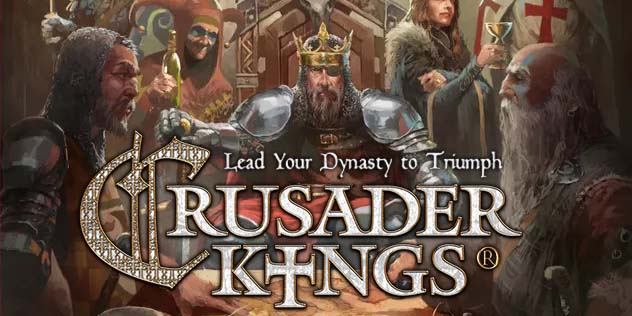
I wasn't very surprised to see a game like Sid Meier's Civilization adapted to a board game. Civ (the computer game) was always heavily inspired by board games to begin it, and so it's mechanics translated easily back into board game formats without losing much other than the broader scope of the PC game.
Paradox's Crusader Kings, on the other hand, is a totally different beast of a PC game. It is an insanely complicated, system-based blend of grand strategy game, RPG, and social sim. It simulates thousands of individual characters across hundreds of countries and duchies through dozens of generations. The possibility space is vast. As such, I would never have expected to see anyone attempt to try to boil down this deep historical simulation into a tabletop board game. Well, I guess I shouldn't say "never". In this age of every media property being adapted to board game formats, I suppose it was inevitable for someone to try.
And someone did try. In 2019, a year before the release of the Crusader Kings III PC game, Swedish board game manufacturer Fria Ligen ("Free League Publishing") released a board game version licensed by Paradox. I received the game as a gift last fall (during the height of social distancing during the COVID-19 pandemic), and so didn't get to start playing the game until well into 2021, when we finally felt a little more comfortable meeting up with friends.
As much a story-generator as a board game
For any PC players coming to the board game, there is something very important that you should know about Crusader Kings: the Board Game: it's focus is largely on the story-telling aspect of the Crusader Kings experience. If you play the Crusader Kings PC game as a hardcore strategy game, then you will probably find the board game lacking in that respect. The Crusader Kings board game is as much a story generator as it is a strategy game -- perhaps moreso.
As a story generator, my friends and I have found Crusader Kings to be very entertaining. It's certainly one of the better story-telling games that I've ever played.
Each action card will include a random event that is either disruptive to the current player,
or which benefits another player.
The way that Crusader Kings creates its little stories is through the random events of each player's action cards, and through the resolution of events by drawing trait tokens. Each turn, a player plays a pre-selected card from their hand. You perform your chosen action, and then you resolve a random event on the card. All cards, except for the "Crusade" action cards, will have a random event that is either harmful to the active player, or which provides a benefit to another player (usually the next player in the turn order).
Many actions and card events will also require that the player draw traits from a bag (similar to a die roll in most other games). Each player character starts with a pre-determined set of traits at the start of the game, and can acquire new traits through marriages, succession, or other events. All your traits go into a bag, and you draw one or more blindly from the bag to resolve a given trait check and determine the outcome of an event.
Player actions, card events, and trait draws, thus combine together to create emergent stories in both the short and long term. Sometimes these little stories can play out over the course of a few actions or turns. Other times, game-long narratives can form. [More]
34573e81-f1df-4d97-b5bc-74233cbd3e71|0|.0
Tags:Crusader Kings, Paradox Interactive, Free League Publishing, emergent narrative, grand strategy, history, medieval, Europe, crusades, war, casus beli, dynasty, succession
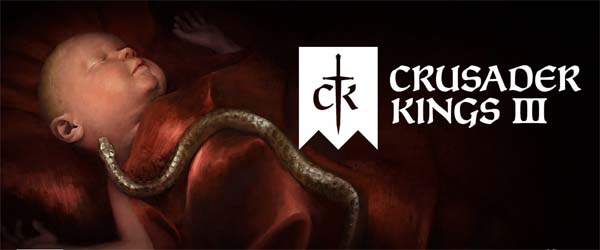
My blog readers know that I'm a fan of historic strategy games. Two of my favorite PC game franchises are Civilization and Total War, and I've dipped my hands into plenty of other historic strategy games ranging from the prehistoric Dawn of Man, all the way to Ultimate General: Civil War and Company of Heroes. But there's one prestigious set of historic strategy games that I've yet to get into. That is Paradox's historic strategy lineup of Crusader Kings, Europa Universalis, and Hearts of Iron. I own Crusader Kings II and Europa Universalis IV on Steam, and I've always wanted to get into them. I have a friend who plays them a lot, and the game looks really fun, but I was just never able to figure either of them out.
I tried booting up both a couple times and was just immediately overwhelmed. I tried the Crusader Kings II tutorial twice, and still didn't feel like I had a firm enough grasp on the game to feel compelled to keep playing. Part of that is because both games have myriad expansions and DLC that have just further complicated the games and repeatedly raised the bar of entry for newcomers. The only one of Paradox's tutorials that I felt gave me a reasonable grasp on the game was the tutorial for Stellaris.
When I saw previews for Crusader Kings III, I immediately put it on my watch list and committed myself to buying it day one, so that I could get in on the ground level in the hopes that it will be easier to grasp before Paradox starts releasing countless DLCs. It seems to have paid off, as I've been hooked on the game on and off since launch, and that addiction has cut into my Civ playing time, as well as delayed many of my blog projects and YouTube content. So for those of you eagerly awaiting new Civ strategies or the next installment of "How Madden Fails to Simulate Football", you can blame Paradox Interactive for the delay...
I am not the state
As someone who was never able to get into the previous game, I cannot say if Crusader Kings III is "dumbed-down" compared to its predecessor. It is, after all, still insanely complicated. But I definitely feel like it has a gentler learning curve and a much more effective tutorial compared to its predecessors. The hand-holding of the tutorial really did help me get a better understanding of how the various mechanics were working, and I've also found it much easier to navigate the revised U.I. and find the information that I'm looking for. I still feel like I have no idea what many of the U.I. panels mean, but I at least understand enough of the basics this time around to actually feel comfortable playing the game.
If you're unfamiliar, Crusader Kings is a medieval grand strategy game in which you play as the king of a small, European (or Middle Eastern or African) kingdom. You engage in diplomacy and court intrigue to increase your wealth and power, fight wars to conquer territory, and manage your growing holdings. But unlike a game like, say Civilization, you do not play as an abstraction of the state itself. Instead, you play as a line of rulers in a single family dynasty. You play as a single king (or queen) character at any given time. This king grows old, and eventually dies, at which point, you take control over you chosen heir and continue playing the game as that character. If you ever get to a point in which you have no family heir to carry on when you die, it's Game Over.
When your player character dies, you take over as that character's primary heir.
As much improved as the tutorial is, I do feel that it has one glaring weakness: it doesn't really cover succession. The tutorial basically puts you in control of a 40-year-old king in Ireland. It shows you how to press a few claims, use a casus belli to press those claims, create a title, deal with vassals, marry off a child, and then it basically just hands you the reigns and says "OK, now keep playing". And yeah sure, these are all the things that you spend most of the game doing. But I would say that arguably the most important part of the game is declaring your heir and setting up your inheritance to maximize the territory that your primary heir retains power over. I think succession is the single most important part of the game, and the tutorial doesn't cover it at all. When it finally happens, there's a tool tip that pops up to explain some stuff, but it didn't really help me all that much to understand what was happening, and a tool tip popping up after the fact certainly didn't help me to prepare for my king's inevitable death and inheritance. [More]
eb8fb312-cf3a-447e-aaf9-982c809e4e0e|0|.0
Tags:Crusader Kings, Crusader Kings 3, Paradox Interactive, Paradox Development Studio, strategy, grand strategy, RPG, history, simulation, medieval, king, Europe, crusades, war, casus belli, dynasty, inheritance
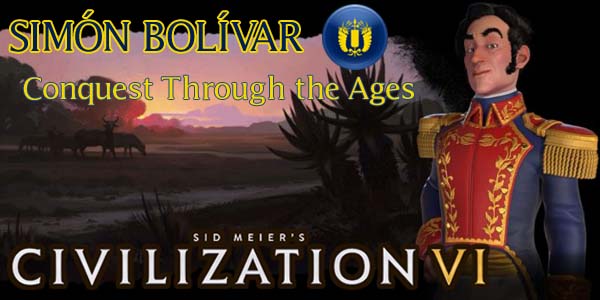
Well, Firaxis is apparently not done with Civilization VI. They will be releasing new DLC packs with new game modes, new civilizations, and new leaders through March of 2021. The first such "New Frontiers" pack released in May of 2020 and included two new civilizations: the Maya and Gran Colombia. As usual, I try to give priority for my strategy guides to civilizations and leaders who have never been depicted as playable in the Civilization games before. In this case, we have a civilization that has been in previous games with a leader who has not, and a leader who has been in a previous game attached to a civilization that has not. I'm going to give priority to the leader who seems more straightforward to play, so that I can get this guide out to my loyal fans as quickly as possible. I will thus start by covering Simón Bolívar of Gran Colombia. Simón Bolívar appeared as a leader of New Spain in Civilization IV: Colonization, but has never been included as a leader in a mainstream Civilization game. And Gran Colombia is making its first appearance in the series as a playable faction.

For future releases that may include multiple leaders, I may put up polls on Patreon to let my Patrons decide which civ or leader to cover first. I may also put up polls asking if my Patrons would prefer that I make guides focused on the new game modes. So if you would like to vote on which content you would prefer to see sooner, I hope you'll consider supporting the creation of this content on Patreon.
Following Simón Bolívar's victory at New Granada in the Colombian War of Independence against Spain, political leaders of the colonies in Colombia and Venezuela established the Republic of Colombia (now known as "Gran Colombia") -- even though the War of Independence was still ongoing. The federal republic divided its territory into 12 "departments", each headed by an intendant (some of whom were also commandante generals in the military), with the nation as a whole being governed by an executive branch with a president and vice president. The country only survived 12 years before dissolving over in-fighting between federalists and centralists in its ruling parties.
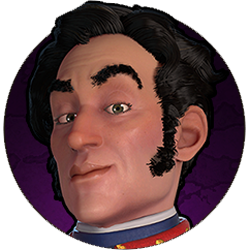
Gran Colombia's president, Simón Bolívar, had a vision of all the former Spanish and Portuguese colonies of Latin America being independent republics that cooperated in a league (similar in principle to the modern-day European Union) with a centralized parliamentary assembly and unified policy towards European colonial powers. The treaty was only ratified by Gran Colombia, and Bolívar's dream faded. A few years later, he became ill and died of tuberculosis, and his nation of Gran Colombia died the following year. Before he died, it is said that Bolívar stated that "America is ungovernable", as he became jaded towards the end by all the bickering and political in-fighting that had dominated Gran Colombia's brief existence. Though he failed to unite the entirety of Latin America, his prominent role in liberating Latin American countries from Spanish rule has him regarded as a father figure of many South American countries. The nations of Bolivia and the Bolivian Republic of Venezuela are named in his honor, and their currencies are know (respectively) as "boliviano" and "bolívar".
DISCLAIMER:
Civilization VI is still a "living game". Strategies for the game (and for specific leaders and civs) may change as Firaxis applies balance patches, introduces new features, or expands the game through further DLC or expansion packs, or as the Civ community discovers new strategies or exploits. As such, the following strategy guide may change from time to time. I will try to keep it up-to-date, and will make notations whenever changes are made. I'll also post links in the official 2K forums and CivFanatics, where I'll also report any changes made. If possible and practical, I will try to retain the original content of the strategy for posterity.
I welcome any feedback or suggestions that readers wish to offer. Feel free to post on the linked forums, or by posting a comment at the bottom of the page.
This guide is up to date as of the release of the "New Frontiers" Maya and Gran Colombia DLC pack (May 2020) (ver. 1.0.1.501)
Simón Bolívar is built to be an aggressive leader in Civilization VI who should use his units' extra movement, and his free Commandante Generals each era to wage lightning warfare against his enemies.
... [More]
60ba8366-dbc5-406e-9e72-e0cb73b5b3ce|2|3.0
Tags:Sid Meier's Civilization, Civilization VI, Gran Colombia, Simon Bolivar, campana admirable, ejercito patrioto, commandante general, llanro, hacienda, carabobo, great general, plantation, era, war
|

| 12 | | | | | | | 60 | | 11 | | | | | | | 55 | | 10 | | | | | | | 50 | | 09 | | | | | | | 45 | | 08 | | | | | | | 40 | | 07 | | | | | | | 35 | | 06 | | | | | | | 30 | | 05 | | | | | | | 25 | | 04 | | | | | | | 20 | | 03 | | | | | | | 15 | | 02 | | | | | | | 10 | | 01 | | | | | | | 05 |
|